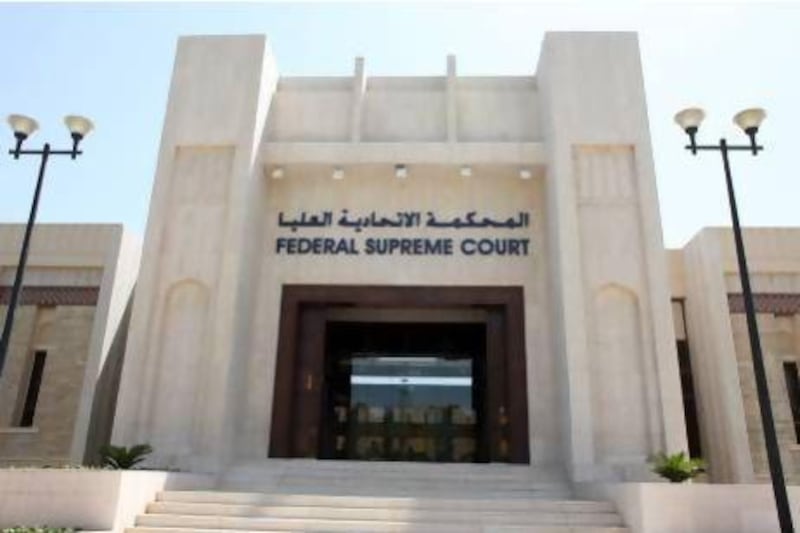The prosecution yesterday made its final arguments in the case of 94 Emiratis accused of sedition.
Prosecutors said the group presented itself in the language of religion and charity while trying to undermine the essence of being Emirati. In a two-hour summation, prosecutors told of "ulterior motives" and "contradictions".
They pointed to documents, emails and financial transactions, and audio and video recordings made over three years.
The session was attended by 73 male and 13 female defendants, 120 relatives, and six members of organisations including the Emirates Human Rights Association and Jurists Association in the UAE.
Six defence lawyers and five public prosecutors were also present.
Prosecutors began by reciting a verse from Surat Al Baqara in the Quran to stress what they said was the theme of the case.
"And when it is said to them: 'Make not mischief on the earth,' they say: 'We are only peacemakers.' Verily! They are the ones making mischief but they perceive not."
The defendants, one prosecutor argued, sought to systematically undermine the legitimacy of the state and reputation of the Rulers.
"This case affects every Emirati that is proud of his nation," the prosecutor argued. "In law, facts are respected because they are objective. In this case, the facts are present."
He referred to witnesses who presented evidence regarding the finances of the organisation.
The prosecutor said the group stirred up discussions using social-media sites with the hope of sparking a revolution.
"Such discussions were held in secrecy, yet in public they showed they were citizens of good will," he said.
Investigators also said they found an email address that was used to communicate with other organisations. They said the defendants shared plans targeting the state with those organisations.
The prosecutor said one of the defendants confessed that he had written a study after the Arab Spring movement in Egypt and Tunisia, titled Action Plan towards the Future of the Emirates.
"This plan clearly shows what they are really after," said the prosecutor.
He added the members and administrators of the organisation created several boards and committees, and most of the accused had specific roles within the organisation.
The committees included a media group and those running social-networking websites.
Their ultimate aim was to distort the country's image internally and externally, and to overthrow the leadership, the prosecution said.
After the Arab Spring, a committee called "Dignity and Fairness" was created to lobby for those who had had their citizenship revoked.
The prosecutor said the organisation sought to lure young students to join and that it used members' personal funds, donated money and zakat to create such committees.
The members, he said, had proved their loyalty was not to the leadership of the country but to the Muslim Brotherhood, to which they had pledged allegiance.
Members of the organisation had travelled to Egypt, he noted, to deliver messages to the deputy of the Brotherhood. The group, it is claimed, provided discussions of the group based in the UAE and set up meetings.
The prosecution has said recordings of the defendants appear to show them planning political action.
In previous sessions, prosecutors played recordings and videos in secret meetings they said pointed to their real intentions.
In one recording, dated May 26, 2011, a voice is heard to say: "The nation currently needs to sacrifice for its dignity and freedom, and the people must give their blood to be inheritors of the tired regimes.
"We have been saying this for five years or more, and we are the real inheritors to bring down these regimes, and we don't say it lightly but we are the knights of change."
In another recording, one suspect said: "Emirati society deserves to get its freedom, and we are the knights who will bring the freedom. We chose to lead the people to this opportunity and release our nation from oppression, fear and slavery.
"The value of freedom is bitter and needs sacrifice, the first of which is our blood and our souls."
After the prosecution arguments, Judge Falah Al Hajeri gave 13 defendants a chance to present their defence. All denied the charges against them, asking for acquittal and bail.
Defendant AH said the accusations did not show "clear intentions".
"Personally, I did not say, do or think to go against my country or to overrule the leadership," he said. "There is no evidence that shows there was a plan towards it."
Defendant IM, said he was in prison when a meeting he was supposed to have attended took place.
Another, accused of luring young students to the group, said his job had nothing to do with students. Yet another said he was innocent because he had been living in another country for the past three years.
Many of them took offence at the prosecution calling them "cancerous cells". "They are attacking us personally, they are attacking our mentalities and personalities," said one defendant.
Another objected to the attempt to describe them as "hypocrites."
Judge Al Hajeri adjourned the case until Monday next week, when the defence will present its case.
aalkhoori@thenational.ae
UAE sedition trial 'affects every Emirati proud of nation'
Prosecutors said the group presented itself in the language of religion and charity while trying to undermine the essence of being Emirati.

Editor's picks
More from the national





